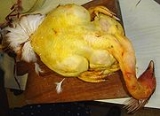
Capon
Encyclopedia

Rooster
A rooster, also known as a cockerel, cock or chanticleer, is a male chicken with the female being called a hen. Immature male chickens of less than a year's age are called cockerels...
that has been castrated
Castration
Castration is any action, surgical, chemical, or otherwise, by which a male loses the functions of the testicles or a female loses the functions of the ovaries.-Humans:...
to improve the quality of its flesh for food.
History
The Romans are credited with inventing the capon. The Lex Faunia of 162 BC forbade fattening hens in order to conserve grain rations. In order to get around this the Romans castrated roosters, which resulted in a doubling of size. European gastronomic textsGastronomy
Gastronomy is the art or science of food eating. Also, it can be defined as the study of food and culture, with a particular focus on gourmet cuisine...
of the past dealt largely with capons, as the ordinary chicken of the farmyard was regarded as peasant fare, "popular malice crediting monks with a weakness for capons."
Effects of Caponization
Caponization is the process of turning a cockerel (young rooster) into a capon. Caponization can be done by surgically removing the rooster's testes, or may also be accomplished through the use of estrogen implants. With either method, the sex hormones normally present in roosters are no longer effective. Caponization must be done before the rooster matures, so that it develops without the influence of sex hormones.Capons, due to the lack of sex hormones, are not as aggressive as normal roosters. This makes capons easier to handle, and allows capons to be kept together with other capons since their reduced aggressiveness prevents them from fighting.
The lack of sex hormones results in meat that is less gamy in taste. Capon meat is also more moist, tender, and flavorful than that of a hen or rooster, which is due not only to the hormonal differences during the capon's development but is also because capons are not as active as roosters, which makes their meat more tender and fatty.
Capons develop a smaller head, comb, and wattle than that of a normal rooster.
Capons are fairly rare in industrial meat production. Chickens raised for meat are bred and raised so that they mature very quickly. Industrial chickens can be sent to market in as little as five weeks. Capons produced under these conditions will taste very similar to conventional meat, making their production unnecessary.
External links
- Caponizing Set Surgery instructions from a home kit.

